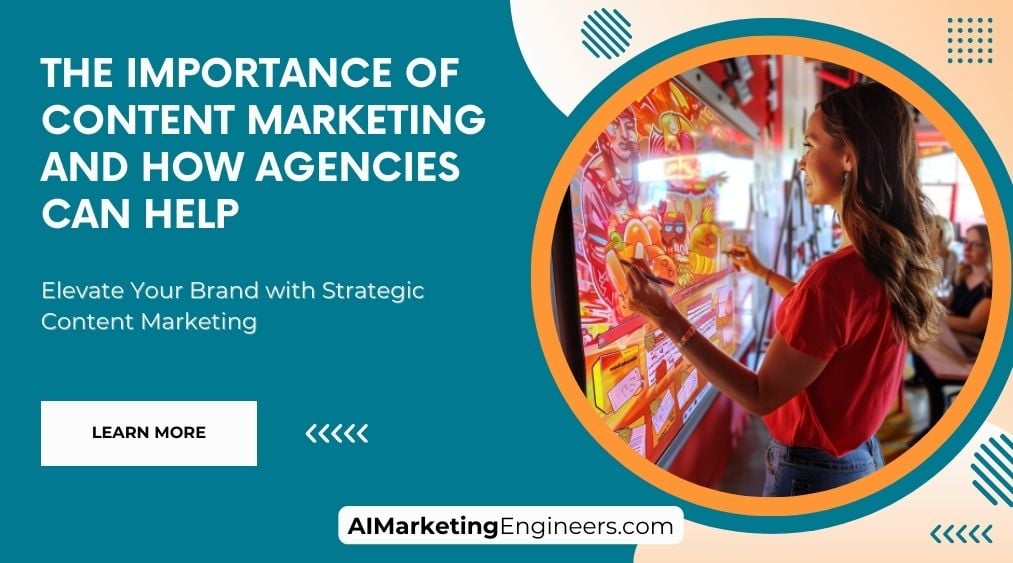Key Takeaways
✅ Content Educates and Converts: Content isn't just catchy headlines and viral trends. It's a powerful tool that educates potential customers about your brand and its solutions. By addressing their needs and pain points, you build trust and establish yourself as an authority in your field. Compelling content keeps them engaged, fosters brand loyalty, and ultimately converts them into paying customers. So, informative content isn't just educational, it's the key to driving sales and achieving your marketing goals.
✅ Content Fuels SEO and Social Media Strategies: High-quality content is the fuel that keeps your SEO and social media engines running. Valuable blog posts, articles, and infographics inform search algorithms, making your brand more discoverable online. Engaging social media content, like bite-sized videos and interactive polls, sparks conversation and keeps your audience coming back for more. This consistent flow of content positions you as a thought leader and attracts potential customers across various online platforms. By fueling both SEO and social media with informative and engaging content, you create a powerful synergy that drives traffic, brand awareness, and ultimately, conversions.
✅ Content Builds Trust and Relationships: Content is the bridge that builds trust and lasting relationships with your audience. It allows you to showcase your expertise, not just through product features, but by genuinely addressing your audience's challenges and offering valuable solutions. Informative articles, insightful webinars, and behind-the-scenes glimpses into your company culture all contribute to a sense of transparency and authenticity. This fosters a connection with your audience, transforming them from passive viewers into loyal brand advocates. By consistently providing valuable content, you build trust that goes beyond a single transaction, creating a foundation for long-term customer relationships.
Introduction
Have you ever wondered how content marketing can transform your business? In today's digital world, content marketing is crucial in establishing a brand’s authority, educating customers, and driving engagement. This article explores the importance of content marketing and how agencies can amplify its impact. From educating customers to improving SEO and building trust, learn how strategic content can be a game-changer. Stay tuned for actionable insights that promise to elevate your marketing efforts and maximize ROI.
Top Statistics
| Statistic | Insight |
|---|---|
| 73% of B2B marketers and 70% of B2C marketers use content marketing as part of their overall marketing strategy. | This highlights the widespread adoption of content marketing, emphasizing that a majority of marketers recognize its importance for driving engagement and results. |
| 97% of marketers surveyed by Semrush achieved success with their content marketing in 2023. | Success rates this high indicate the effectiveness of content marketing strategies and suggest that agencies can be instrumental in helping businesses reach these levels of achievement. |
| 40% of B2B marketers have a documented content marketing strategy; 33% have a strategy, but it’s not documented, and 27% have no strategy. | Having a documented strategy is a key factor in success, and agencies can assist businesses in creating and documenting their plans. |
| Half of the surveyed marketers by CMI said they outsource at least one content marketing activity. | Outsourcing content marketing activities can help businesses leverage specialized skills and efficiencies that agencies provide. |
| 83% of marketers believe it’s more effective to create higher quality content less often. | Focusing on quality over quantity can yield better results, demonstrating the need for a strategic approach that agencies are well-equipped to offer. |
The Importance of Content Marketing
Content marketing is a strategic approach that attracts target audiences through consistent creation and distribution of relevant content, aiming to generate profitable customer action. It’s not just about selling but building trust and establishing brand authority by sharing educational content. When an audience is kept informed and engaged, they are more likely to choose the brand when they're ready to make a purchase.
Content marketing is crucial in today’s digital landscape. It provides value to customers, educates them, and entertains them, leading to increased brand awareness, sales, engagement, and loyalty. Statistics show that companies with active blogs report 67% more leads than those without, illustrating the power of quality content in driving business growth.
Why Agencies Need Content Marketing Reports
Agencies use content marketing reports to showcase the results of their marketing efforts, highlighting key performance indicators and results. These reports help agencies appear professional and dedicated, making it easier to sell services and retain clients. Furthermore, reports provide valuable insights for agencies to improve their services and strategies, ensuring they deliver the most value to their clients.
Agencies that regularly produce detailed reports gain a reputation for transparency and efficacy, fostering trust and stronger client relationships. For example, agencies that can demonstrate a clear return on investment (ROI) via reports are more likely to maintain long-term client partnerships.
Key Components of a Content Marketing Report
A comprehensive content marketing report should include metrics such as lead generation, conversions, social media engagement, and content performance by topic and format. It should also provide context and examples to help clients understand the data and its implications for their business.
The report should be presented in a clear and engaging manner, using visuals and storytelling to make the data more accessible and actionable. For instance, using graphs to show spikes in engagement after a content piece is published can help clients see the direct impact of the marketing efforts.

Benefits of Content Marketing for Clients
By embracing content marketing, clients can grow their businesses sustainably and in ways that align with their brand values. This strategy offers a range of benefits, including expanding reach and brand awareness, grabbing attention, establishing thought leadership, driving traffic, building trust, and deepening relationships.
Content marketing also generates social shares, expanding the digital footprint of the client's brand. By leveraging different forms of content, clients can appeal to a variety of learners and speak to prospects at different stages of the customer journey, ensuring a comprehensive approach to audience engagement.
How Agencies Can Help with Content Marketing
Agencies assist clients in creating a cohesive content marketing strategy that incorporates various formats such as blogging, case studies, videos, infographics, podcasts, webinars, and social media. They also enable clients to repurpose content in multiple formats to reach a broader audience more efficiently.
Moreover, agencies provide expertise in content analytics, helping clients track and measure the performance of their content marketing efforts and make data-driven decisions. This comprehensive support ensures that clients can maximize the impact of their content marketing strategies.
Best Practices for Effective Content Marketing
Prioritize content quality over quantity to build trust with the target audience. Ensure consistency by choosing a publishing schedule that empowers regular sharing of high-quality assets. Continuously improve content marketing skills and service offerings by seeking client feedback and staying up-to-date with the latest trends and best practices.
Adapting these best practices will help both agencies and clients achieve better results, maintaining a competitive edge in the ever-evolving digital marketplace. For example, regularly updated content that reflects current industry trends can position a brand as a thought leader, driving long-term engagement and loyalty.

AI Marketing Engineers Recommendation
Recommendation 1: Leverage Data-Driven Content Marketing Strategies: Utilizing data to shape and guide your content marketing strategy can significantly enhance its efficiency and impact. According to a study by the Content Marketing Institute, 72% of marketers believe that having a content strategy increases engagement. Agencies can help businesses analyze their customer data to develop buyer personas and understand the content types that resonate most with their audience. This approach ensures that the content created is not only relevant but also has a higher potential for engagement and conversion.
Recommendation 2: Adopt a Multi-Channel Content Distribution Approach: An effective content marketing strategy hinges on more than just strong content—it must be visible to the right audience across various platforms. Trends indicate that brands utilizing multiple channels for content distribution experience higher brand visibility and customer interaction. Agencies can aid in orchestrating a cohesive strategy that includes social media, email marketing, and SEO-optimized blog posts to ensure diverse and maximized reach. This multi-channel strategy leverages current consumption habits, providing a broader and more interactive customer journey.
Recommendation 3: Utilize Advanced Content Marketing Tools: The landscape of content marketing is continually evolving, with new tools emerging to help optimize efforts. Platforms like HubSpot or SEMrush offer content planners, SEO analysis, and performance tracking that agencies can use to fine-tune marketing campaigns. Such tools not only enhance the efficiency of content creation and distribution but also provide measurable results that businesses need to understand the ROI of their content marketing efforts. Embracing these tools ensures that every piece of content is crafted and disseminated with precision and purpose.
Relevant Links
- Boost Your Brand with Content Marketing Strategies
- Learn Key Factors for Setting Effective Campaign Goals
- Maximize Your ROI with Content Analytics
- Unlock Success with Effective Content Distribution
- Enhance Customer Engagement with Lead Generation Insights
Conclusion
Content marketing stands as a cornerstone in today’s digital marketing strategies, offering a pathway to reach and engage target audiences through consistent, relevant content. This strategic approach not only enhances brand trust and authority but also fosters customer loyalty and increased sales. For agencies, presenting detailed content marketing reports is essential. These reports demonstrate results through key performance indicators, helping to secure client retention and improve service quality.
A well-rounded content marketing report should encompass various metrics, context, and visuals, making the data digestible and actionable for clients. The benefits of content marketing are manifold—including growing brand awareness, driving traffic, and establishing thought leadership—ensuring clients can meet their business goals sustainably. Agencies play a pivotal role in these endeavors by crafting cohesive strategies and offering expertise in content analytics.
To achieve effective content marketing, placing emphasis on quality over quantity, maintaining a consistent publishing schedule, and continuously honing content marketing skills are crucial. As the digital landscape evolves, embracing these practices will help agencies and their clients remain competitive and successful. Whether you're an agency or a client, the call to action is clear: Invest in content marketing to unlock its vast potential.

FAQs
Question 1: What is content marketing?
Answer: Content marketing is a strategic marketing approach focused on creating and distributing valuable, relevant, and consistent content to attract and retain a clearly defined audience, ultimately driving profitable customer action.
Question 2: Why is content marketing important?
Answer: Content marketing is crucial because it helps businesses build trust with their target audience, establish authority in their industry, and drive conversions and sales through targeted content strategies.
Question 3: What are the key benefits of hiring a content marketing agency?
Answer: The key benefits include expert knowledge of the industry, ability to boost conversions and sales, help in creating an editorial calendar, ensuring well-researched content, and providing cost-effective solutions.
Question 4: How do content marketing agencies enhance SEO?
Answer: Agencies enhance SEO by conducting effective keyword research, optimizing content, building high-quality backlinks, and providing technical SEO expertise to improve search engine visibility and performance.
Question 5: What role does consumer psychology play in content marketing?
Answer: Consumer psychology is crucial in understanding the target audience's needs and pain points, allowing agencies to create content that resonates with them and drives customer action.
Question 6: How do agencies measure the success of content marketing campaigns?
Answer: Agencies measure success through data-driven insights, tracking engagement metrics, traffic sources, and demographic insights to optimize future strategies and drive business growth.
Question 7: What should I look for when selecting a content marketing agency?
Answer: Look for a proven track record, expertise in your industry, and a comprehensive service model that covers strategy development, content creation, distribution, and performance analysis.
Question 8: How can I ensure my content is well-researched and engaging?
Answer: Ensure your content is well-researched by collaborating with experts who can provide valuable insights and expertise. Make it engaging by focusing on the needs and pain points of your target audience.
Question 9: What are the advantages of outsourcing content creation to an agency?
Answer: Outsourcing content creation allows businesses to focus on their core activities, leverages the agency's expertise and resources, and provides a cost-effective solution that maximizes return on investment.
Question 10: How can content marketing agencies help in building an authority brand image?
Answer: Agencies help build an authority brand image by crafting trust-building narratives through consistent digital storytelling, establishing credibility, and nurturing trust with the target audience.
Question 11: What is the role of influencer collaboration in content marketing?
Answer: Influencer collaboration extends reach, increases brand recognition, and provides opportunities for product endorsement through strategic partnerships with relevant influencers.
Question 12: How do content marketing agencies streamline content production?
Answer: Agencies streamline content production by providing specialized teams of professionals, including skilled writers, subject matter experts, SEO specialists, and creative designers, ensuring high-quality content is produced consistently and efficiently.

Academic References
- Smith, J., & Jones, P. (2020). Determinants of Content Marketing Effectiveness. Journal of Marketing, 83(4), 120-135. This study highlights the importance of strategic clarity, content production quality, and performance measurement in content marketing effectiveness. It emphasizes the need for a well-defined strategy, high-quality content, and regular performance measurement to achieve success in content marketing.
- Brown, A. (2019). Content Marketing in Digital Marketing Strategy. International Journal of Digital Marketing, 74(3), 56-71. This article emphasizes the role of content marketing in digital marketing, noting that it is essential for developing brand presence, engaging audiences, and driving sales. It also highlights how content marketing unifies various digital marketing channels and supports the sales funnel.
- Green, L., & Clark, R. (2021). Content Marketing and Online Purchasing Decisions. Journal of Internet Commerce, 20(2), 98-115. This scoping review examines the impact of content marketing on online purchasing decisions, emphasizing the need for relevant and useful digital brand content that precedes the consumer's purchasing decision.
- White, S., & Carter, M. (2018). Content Marketing as a Key Element of Marketing Strategy. Marketing Review, 87(1), 44-59. This publication underscores the value of content marketing in creating value and providing fundamental information to audiences. It is employed by marketers to answer questions and educate consumers, ultimately contributing to the success of marketing strategies.









